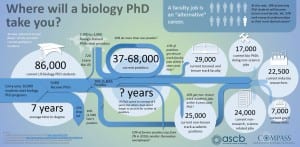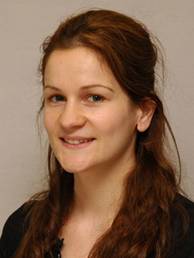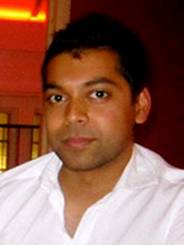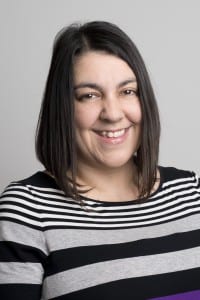 Dr Anthea Martin gained a PhD in Molecular Biology from the University of Dundee. Here she speaks about her role at CRUK as a Science Communications Manager.
Dr Anthea Martin gained a PhD in Molecular Biology from the University of Dundee. Here she speaks about her role at CRUK as a Science Communications Manager.
[Since giving this interview, Dr Martin has taken up a role as a Case-for-Support Development Manager at Marie Curie]
How did you move from your PhD to your current role?
I probably realised about 3 or 4 months into my PhD that a long-term career in research wasn’t for me – I found the atmosphere a little too competitive, and as I’m quite a shy person, I wasn’t great at the networking and self-promotion aspects of academia. But it was actually only a few months before I finished my PhD that I worked out what I might do instead. I was reading a journal, and it fell open on a page about a medical writer. The job appealed to me as it involved writing about science and giving presentations, which were parts of research I’d enjoyed. I applied to lots of medical communications agencies – companies contracted by pharma companies or biotechs to manage communications about new developments – and got a position at Gardiner-Caldwell.
Gardiner-Caldwell had a great ethos of training and supporting new writers, and I learned a lot from them, especially about handling clients and stakeholder interests – the business side of science – and about writing for lots of different types of audiences. I was with them for about 2 and half years, and really enjoyed the variety of the role, but during that time I realised that I would feel more fulfilled working for a charity than for pharma companies. I actually had cancer when I was younger, and as a cancer survivor, one of the reasons I went into research was to try to give something back. So I figured working for a charity might be another way to do that, and that’s when I found a position at CRUK working on their annual report. I went on to work in a range of science communications roles at CRUK, culminating in my current role, where I work closely with fundraisers, and aim my communications directly at potential donors, hoping to move them to support CRUK’s work.
What does a normal working day look like for you?
I don’t think there is a ‘normal’ working day! I can be meeting with fundraisers to find out what they need for a particular fundraising pitch, searching our portfolio of work to find projects that might appeal to certain potential donors, or writing up projects that need support. I also sometimes go out and meet donors or scientists, or help fundraisers in a more strategic sense, sharing the next big developments that they should be fundraising for.
What are the best things about working in your role?
I really love being able to bring science and research to life. I think science can be an area people are afraid of, so it’s great to know that you’ve turned this potentially alien and scary thing into something real and inspiring for people. And helping people make the decision to give to a good cause is wonderful, as is working for an organization that touches so many lives. I also enjoy speaking with the scientists, and hearing about cutting-edge science, sometimes even before it’s actually happened, as it’s just at the funding application stage.
I like the breadth of knowledge that I get in this role, as compared to the deep but narrow knowledge I acquired in research. I get to see the big picture of the science, and how it all fits together to benefit people. And I like my colleagues; we’re a very close-knit team, with a good sense of humour, and the same ultimate goal – but I also enjoy that I get to work independently a lot of the time too.
What are the biggest challenges you face in your work/what are the worst bits? Please think about elements that might put others off, even if you don’t mind them.
There’s a lot of sitting at a desk, which I suppose people can be a bit down on. If you’d told me when I was 21 that I would end up doing a desk job, I would’ve thought it was horrendous! But it’s really not all that bad. The other potential downside is the bureaucracy associated with any quite-large organization. Unlike in the lab, when it’s just you and your research, it takes lots of people, discussions, and processes to make a decision.
What’s the progression like/where do you see yourself going from here?
There are more supervisory positions in the team that people can apply for when they’re available. As I have, people also tend to move around within CRUK, which is a great way to try new things, and some people move on to communications roles at other organisations, like charities or universities.
What top tips would you pass on to a PhD student/post-doc interested in this type of work?
If you’ve only worked within academia, it can be really frightening when you’re thinking of leaving it. So I’d tell people not to be afraid! A PhD will give you a whole host of skills that employers care about: you’ll be able to forward plan, be efficient with your time, and to trouble-shoot problems. A lot of researchers are also driven, enthusiastic, and passionate, all qualities that are great to bring to any role.
I’d also really recommend that people try to get some experience in the field they want to go into, even if it’s just a couple of weeks. That way you can learn more about the role, but also about the types of organization you might prefer to work for.
 Close
Close


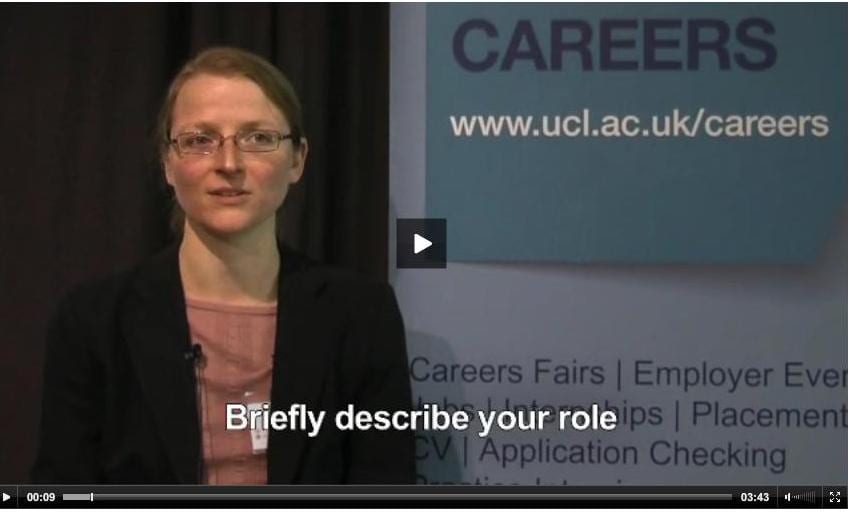

 Dr Buddhini Samarasinghe is one of the founders of
Dr Buddhini Samarasinghe is one of the founders of 

